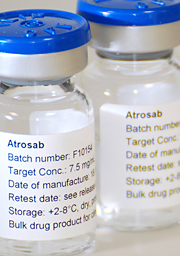- © Baliopharm AG 2026
- Imprint
- Privacy policy
- Cookie policy
- Terms of use
- Sitemap
Product Pipeline / ATROSAB
The full-length TNF-R1 antagonist
Lead compound for the treatment of autoinflammatory diseases.
Atrosab is a new generation humanized monoclonal antibody that specifically blocks the pro-inflammatory TNF receptor 1 (TNF-R1), without interacting with the TNF receptor 2 (TNF-R2). As TNF-R2 is known to play an important role for the defense of viral and bacterial infections, compounds not interacting with the TNF-R2 are expected to have a significantly improved safety profile, especially with respect to the occurrence of infections. Possible indications for Atrosab include rheumatoid arthritis, psoriatic arthritis, ankylosing spondylitis, plaque psoriasis, and inflammatory bowel disease (M. Crohn and colitis ulcerosa) but also chronic liver diseases such as Nonalcoholic steatohepatitis (NASH). Furthermore, as TNF-R2 is also mediating remyelination whereas TNF-R1 is involved in a signaling pathway for demyelination, Atrosab is also expected to be effective in neuro-inflammatory and neuro-degenerative diseases like multiple sclerosis or Morbus Parkinson.
In preclinical studies, proof of concept has already been demonstrated in models of rheumatoid arthritis, both in transgenic mice and in non-human primates, as well as in a model for multiple sclerosis (experimental autoimmune encephalomyelitis in transgenic mice).
In 2014, the first in man clinical study (phase I) has been concluded and demonstrated the safety profile of Atrosab in healthy volunteers.
Baliopharm is currently developing an improved formulation for subcutaneous application before advancing to proof of concept studies in patients (phase II clinical trial).
Scientific publications:
1. Essential protective role of tumor necrosis factor receptor 2 in neurodegeneration. Yun Donga Y, Fischer R, Naudéa P, Maier O, Nyakasa C, Duffey M, Van der Zee E, Dekens D, Douwenga W, Herrmann A, Guenzie E, Kontermann R, Pfizenmaier K, Eisel U. PNAS 2016 Oct 25; 113 (43): 12304–12309.
2. Selective Blocking of TNF Receptor 1 Attenuates Peritoneal Dialysis Fluid Induced Inflammation of the Peritoneum in Mice. Kälble F, Damaske J, Heide D, Arnold I, Richter F,Maier O, Eisel U, Scheurich P, Pfizenmaier K, Zeier M, Schwenger V, Ranzinger J. PLOS ONE. 2016 Oct 18; DOI:10.1371/journal.pone.0163314.
3. Targeting sTNF/TNFR1 Signaling as a New Therapeutic Strategy. Fischer R, Kontermann R, Maier O. Antibodies 2015; 4: 48-70.
4. Antibody-Mediated Inhibition of TNFR1 Attenuates Disease in a Mouse Model of Multiple Sclerosis. Williams S, Maier O, Fischer R, Fairless R, Hochmeister S, Stojic A, Pick L, Haar D, Musiol S, Storch M, Pfizenmaier K, Diem R. PLoS ONE 9(2): e90117.
5. An anti-TNFR1 scFv-HSA fusion protein as selective antagonist of TNF action. Berger V, Richter F, Zettlitz K, Unverdorben F, Scheurich P, Herrmann A, Pfizenmaier K, Kontermann R, Protein Engineering, Design & Selection 2013; 26 (10): 581–587
6. Antagonistic TNF Receptor One-Specific Antibody (ATROSAB): Receptor Binding and In Vitro Bioactivity. Richter F, Liebig T, Guenzi E, Herrmann A, Scheurich P, Pfizenmaier K, Kontermann R. PLoS ONE 8(8): e72156.
7. Therapeutic effect of PEGylated TNFR1-selective antagonistic mutant TNF in experimental autoimmune encephalomyelitis mice. Nomura T, Abe Y, Kamada H, Shibata H, Kayamuro H, Inoue M, Kawara T, Arita S, Furuya T, Yamashita T, Nagano K, Yoshikawa T, Yoshioka Y, Mukai Y, Nakagawa S, Taniai M, Ohta T, Serada S, Naka T, Tsunoda S, Tsutsumi Y. J Control Release. 2011 Jan 5; 149(1):8-14.
8. Anti-inflammatory effects of a novel TNFR1-selective antagonistic TNF mutant on established murine collagen-induced arthritis. Abe Y, Nomura T, Yoshioka Y, Kamada H, Tsunoda S, Tsutsumi Y. Adv Exp Med Biol. 2011; 691: 493-500.
9. ATROSAB, a humanized antagonistic anti-tumor necrosis factor receptor one-specific antibody. Zettlitz KA, Lorenz V, Landauer K, Münkel S, Herrmann A, Scheurich P, Pfizenmaier K, Kontermann R. MAbs. 2010 Nov-Dec;2(6): 639-47.
10. A crucial role for tumor necrosis factor receptor 1 in synovial lining cells and the reticuloendothelial system in mediating experimental arthritis. Arntz OJ, Geurts J, Veenbergen S, Bennink MB, van den Brand BT, Abdollahi-Roodsaz S, van den Berg WB, van de Loo FA. Arthritis Res Ther. 2010;12(2):R61.
11. Antagonists of TNF action: clinical experience and new developments. Kontermann R, Scheurich P, Pfizenmaier K. Expert Opin Drug Discov. 2009 4(3): 279-292.
12. The treatment of established murine collagen-induced arthritis with a TNFR1-selective antagonistic mutant TNF. Shibata H, Yoshioka Y, Abe Y, Ohkawa A, Nomura T, Minowa K, Mukai Y, Nakagawa S, Taniai M, Ohta T, Kamada H, Tsunoda S, Tsutsumi Y. Biomaterials. 2009 Dec; 30(34): 6638-47.
13. A humanized tumor necrosis factor receptor 1 (TNFR1)-specific antagonistic antibody for selective inhibition of tumor necrosis factor (TNF) action. Kontermann RE, Münkel S, Neumeyer J, Müller D, Branschädel M, Scheurich P, Pfizenmaier K. J Immunother. 2008 Apr; 31(3): 225-34.
14. Neurodegenerative and Neuroprotective Effects of Tumor Necrosis Factor (TNF) in Retinal Ischemia: Opposite Roles of TNF Receptor 1 and TNF Receptor 2. Fontaine V, Mohand-Said S, Hanoteau N, Fuchs C, Pfizenmaier K, Eisel U. The Journal of Neuroscience. 2002; Vol. 22.

